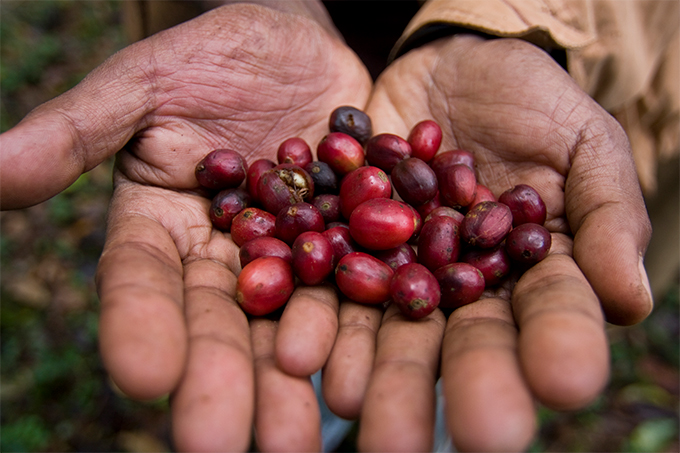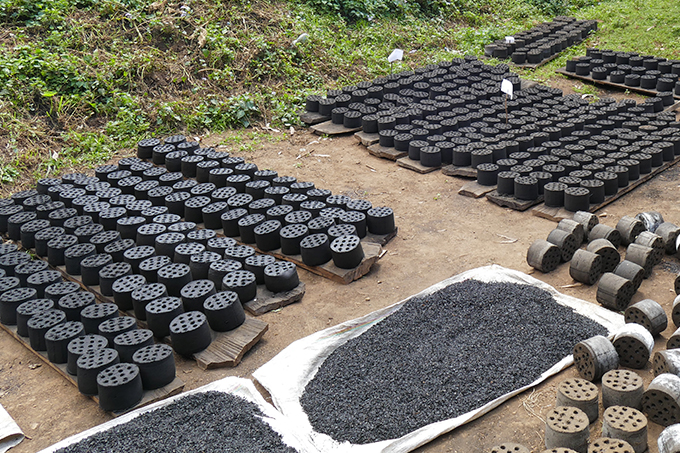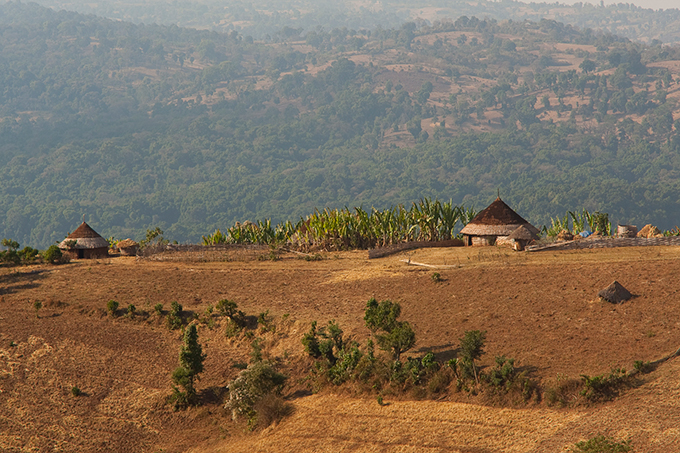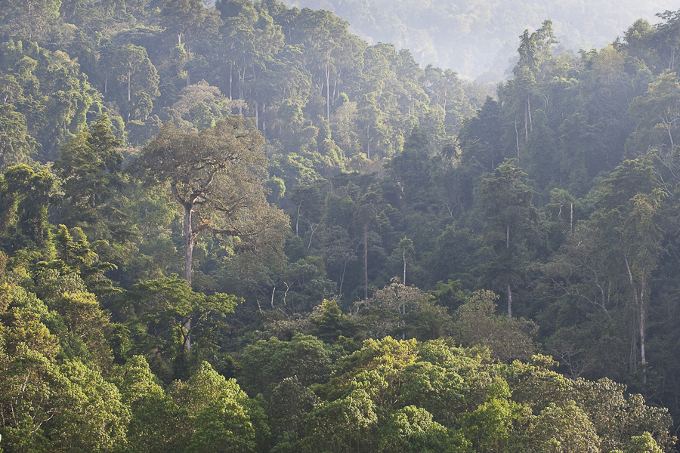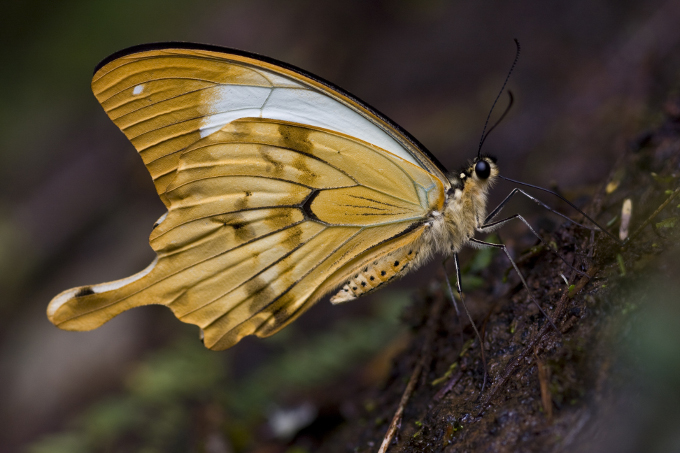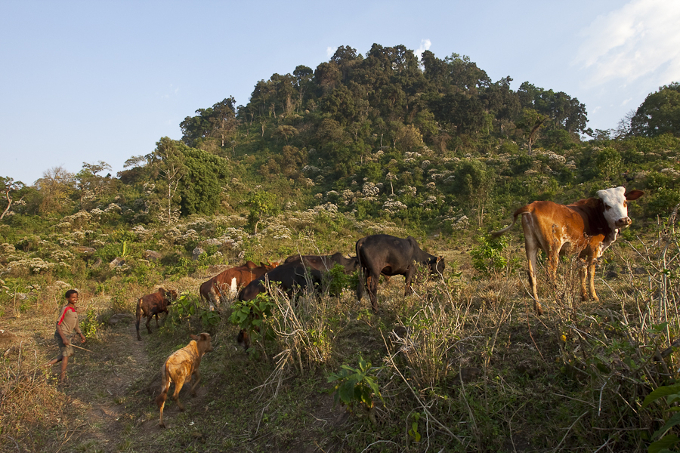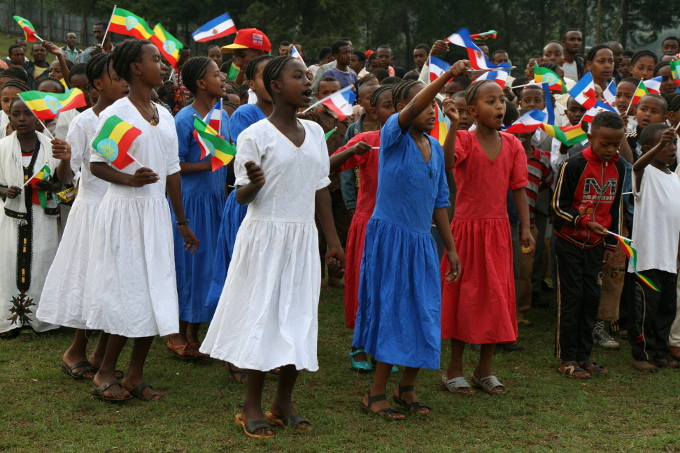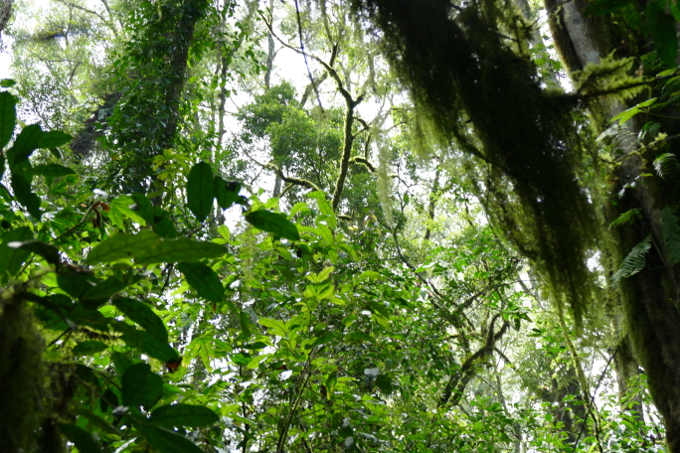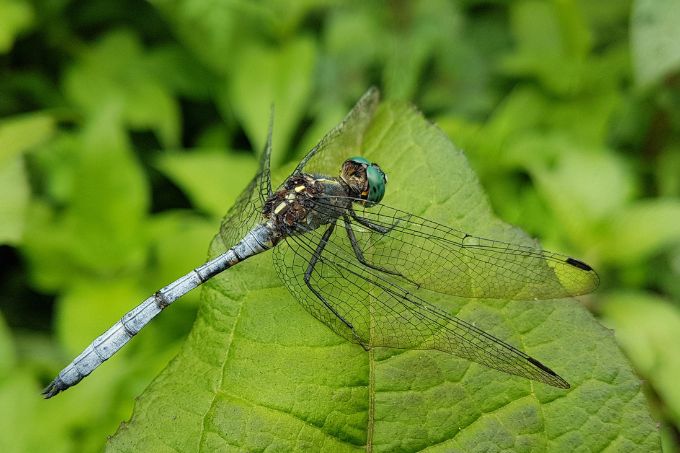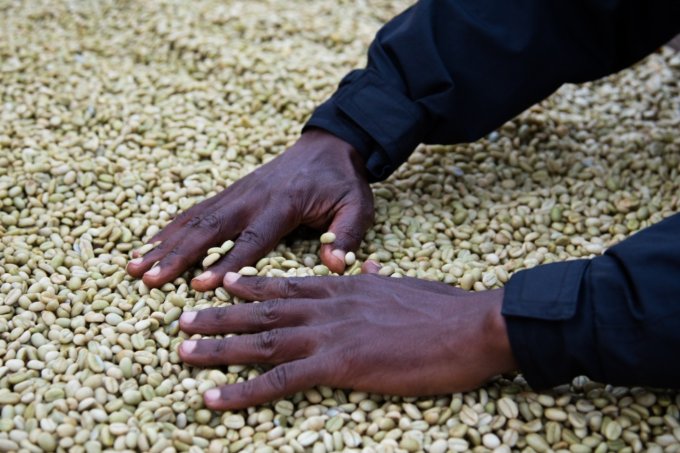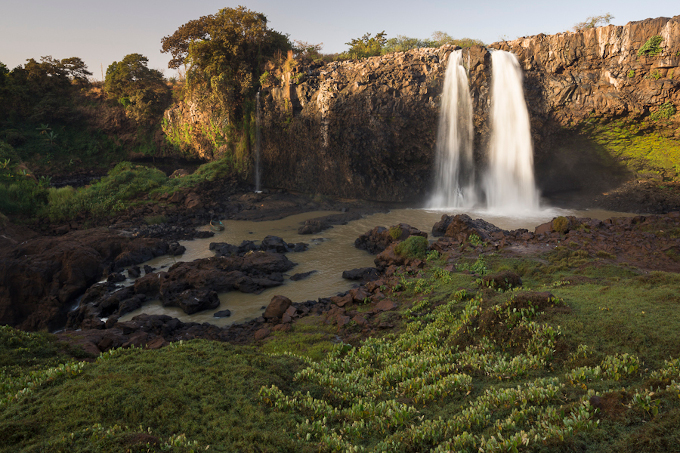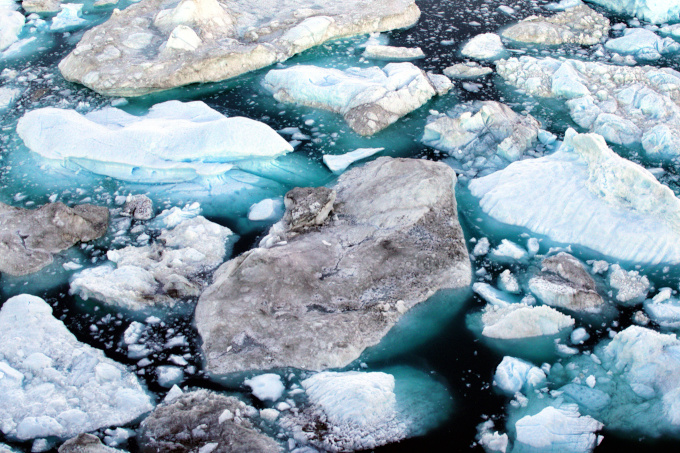Coffee-novation
Green diversification of Ethiopia’s garden coffee value chain
Kafa Biosphere Reserve in Ethiopia, the origin of Arabica coffee, is increasingly challenged by the lack of long-term employment, income and innovation for sustainable development and adaptation to the impacts of climate change. Garden coffee is coffee grown by farmers in the vicinity of their home. It is traditionally organic, although not currently certified, and grown in very small quantities alongside other crops and shade-giving trees. Garden coffee that is grown in home gardens of the Kafa Biosphere Reserve represents an essential source of income for the majority of smallholder households. However at present it is non-commercialised and undervalued, with no quality management in place. The consortium, consisting of two commercial partners and two NGOs from the green sector, aims to develop and restructure the garden coffee value chain.
The project will create local self-sustaining and environmentally-friendly business models around the commercialised garden coffee value chain by developing new products including organic Kafa garden coffee, organic cascara and potentially also coffee husk briquettes.
This will contribute to increasing the market value and access of garden coffee. Ultimately income will be diversified and jobs created. This will serve as an inspiring model for local development and contribute to a climate-resilient green economy in Ethiopia.
Our achievements
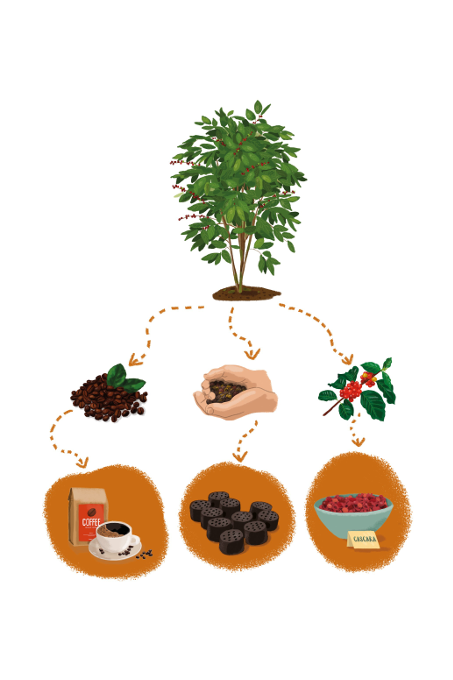
Diversity of Ethiopia's garden coffee value chain. - Graphic: NABU/ Julia Friese
- New market access: organically certified garden coffee.
- New products from cascara, the coffee husk.
- Renewable green fuel from waste product: coffee husk briquettes.
- Jobs: At least 25 new jobs have been created (minimum 20% of those for women and 50% youth).
- Income opportunities: At least 1,450 people benefit (minimum 30% women and 25% youths) from increased income at individual level.
- Project viability: 40,000 kg of the single origin garden coffee have been sold by the commercial partners.
- Commercial partners have responsible business conduct (RBC) policies and annual reports on their business conduct are available online.
Consortium
Administrative partner: The Nature and Biodiversity Conservation Union (NABU)
Key commercial partner: Lebensbaum
Forests of the World (FoW)
NABU Ethiopia
Goldkind GmbH
Kafa Forest Coffee Farmers Cooperative Union (KFCFCU)
South West Ethiopia Peoples‘ Region (SWEPR)
Kafa Zone Administration
Supported by
Ministry of Foreign Affairs of Denmark
Danida Market Development Partnerships
Project Period
July 2019 – December 2023
The Nature and Biodiversity Conservation Union (NABU)
While it is Germany’s oldest and largest environmental association, with more than 770,000 members and sponsors, it is a registered international NGO in Ethiopia and has been active there since 2006. NABU has established a respected role in the Kafa region through closely working with local communities and government partners.
NABU is the project’s administrative partner and responsible for overall project management, technical backstopping, administrative and financial supervision and monitoring, evaluation and adaptation. Throughout the project, NABU will be in direct communication with all consortium partners, coordinating and guiding the consortium, updating partners on the general project progress, managing consortium meetings and responsible for communication and reporting to the Ministry of Foreign Affairs of Denmark.
Lebensbaum
Lebensbaum is the project’s key commercial partner and will be involved in the value chain development of organic garden coffee beans. Lebensbaum will provide technical assistance for coffee quality improvement, and be in charge of market access, export, product development and product marketing. They contribute their rich experience in cooperating on organic products with smallholder farmers and cooperatives from all over the world.
Forests of the World (FoW)
Founded in Denmark in 1983 with the objective to conserve and manage the world’s forests in a sustainable way. We create opportunities for forest dependent communities and people who aspire to save the forests of the world. FoW’s main role is providing technical advice, in particular capacity building on value chain development, business planning and product innovation. With substantial experience in sustainable value chains, FoW will provide technical support to local implementation, assistance to local capacity building and communication activities.
NABU Ethiopia
With its experience in implementing activities with the Kafa Biosphere Reserve’s communities for over a decade, NABU Ethiopia is perfectly positioned as the local implementing partner and is in charge of day-to-day project implementation. The work will be carried out by the NABU Project Office Bonga and supported by NABU’s Head Office in Addis Ababa.
Goldkind GmbH
The Austrian company is involved in the development of the value chain for coffee cherry husks (cascara) made from organic garden coffee. Goldkind GmbH imports and sells cascara for various infusion drinks. In this way, the company promotes the upcycling of by-products of coffee production and contributes to income diversification and the development of sustainable and self-sustaining business practices within the garden coffee value chain.
Kafa Forest Coffee Farmers Cooperative Union (KFCFCU)
The Kafa Forest Coffee Farmers Cooperative Union (KFCFCU) brings together almost 10,000 smallholders from 43 cooperatives. Thanks to their many years of experience, the members are true experts in the cultivation of coffee in the Kafa region. Founded in 2004 and Fairtrade certified in 2006, the union enables its members to export their coffee products effectively to the market, thus securing sources of income.
Kafa Zone Administration
The Kafa Zone Administration is a long-standing partner of NABU and fully supports the implementation of the project in many different ways.
the project in detail
The last remaining montane cloud forests that contain wild trees of Coffea arabica as a natural part of the ecosystem exist in the Kafa Zone, around Bonga. This is where the Kafa Biosphere Reserve is located. more →
The Kafa Zone still boasts large, overlapping areas of mountainous afromontane cloud forest. The region is one of the 36 “Biodiversity Hotspots” worldwide and is therefore of global significance for conservation. Around 100 woody plant and many bird and mammal species are recorded. more →
As a result of the dependence on wood of the local population, and conversion of the forest to arable land, the biodiversity is being dramatically reduced. Soil erosion, increased water run-off may lead to floodings. The climate change also effects the region already. more →
The forest ecosystem makes an important contribution to the livelihoods of people in the area. It provides wild coffee, a variety of commercially valuable spices and honey from wild bees. Apart from collecting wild coffee in the forest, the local population grow ‘garden’ coffee and farm crops, vegetables and fruit. more →
Kafa Biosphere Reserve is characterised by impressive natural scenery which extends over more than 760,000 hectares. Lush ancient forests, thriving wetlands, steep valleys, towering mountains, and gently rolling plains invite the visitor to venture further. more →
Dragonflies are charismatic insects: Their traits include spectacular aerial maneuvers, jewel-toned bodies and an important role in the ecosystem. More than 6,400 dragonfly species worldwide are known to science. One of them is the “Ethiopian Highlander”. more →
related topics
NABU promotes sustainable regional development worldwide. Our international projects always include income-generating activities, which comprehensively address all three dimensions of sustainability - balancing economy, ecology and social equality. more →
NABU supports the creation, establishment and effective management of protected areas as part of our international activities. A special emphasis lies on UNESCO biosphere reserves, however, not exclusively. more →
An ecosystem is a complex of living organisms. NABU focuses on restoring ecosystems to their original state and important regulatory functions such as carbon sequestration. Ideally, by creating conditions in which the ecosystem can recover on its own. more →
Climate change and biodiversity loss are the most pressing challenges to humanity. Finally, people start to realize they are both sides of the same coin. NABU stands with science. We demand and support all efforts to reach a net-zero carbon economy globally. more →

